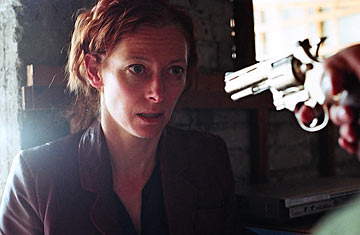
Tilda Swinton in a scene from Julia.
Julia is a mess. In her shiny green dress she staggers through a crowded L.A. bar, talking too loud, running her hand inside a man's shirt and saying, when asked by a stranger what she does, "I like to make people's dreams come true." The next morning she wakes up in the back seat of the stranger's car, he asleep next to her, and opens her mouth in a grimace of disdain, as if trying to spit out the memory of last night and all the other last nights. A 40-year-old alcoholic who keeps embarrassing herself out of gainful employment, the lead character of Erick Zonca's Julia would seem a figure worth only pity or derision. But because she's incarnated by uber-actress Tilda Swinton, Julia also merits awe. She's not kidding when she says, "I have this unbelievable power over men." Among discerning moviegoers, men and women alike.
The mass audience may have noticed this tall, titian-haired actress ornamenting some of the more ambitious mainstream films. In 2000, Swinton was the boss of a hippie commune who badgers Leonardo DiCaprio in The Beach. Later she played a studio executive opposite Nicolas Cage in Adaptation and tried to explain the plot of Vanilla Sky to Tom Cruise. Fantasy fans remember her as the icy White Witch of the Narnia films and as the soaring, fallen Angel Gabriel tempting Keanu Reeves in Constantine. Recently, and notably, Swinton has had on-screen affairs with Brad Pitt (The Curious Case of Benjamin Button) and George Clooney (Burn After Reading). She was also Clooney's legal antagonist, an agribusiness executive, in Michael Clayton — a film that earned her an Academy Award for Best Supporting Actress. (See pictures of Oscar's leading ladies.)
But it's in the art houses that Swinton, 48, reigns. Part of the renown comes from her aura: slim, pale and towering, keen of features and intellect, she invests her film characters with an imperious mien that some viewers want to mess with — but they can't, because she's been there first; she's always willing to defile herself for her art. She brings a fearless commitment to all her movies, big and small, entertaining or dreadfully daunting; she'll try anything and make it work. It's a mystery how this bold, striking star-in-the-making avoided Hollywood's eye for 15 years, but for off-Hollywood, off-kilter dramas, Swinton has been the go-to lass — the queen of the indies. (See a multi-media analysis of 78 years of Oscar by Richard Corliss.)
Anyway, some kind of royalty; it's hers by birth. Swinton was born into a clan of warrior aristocrats whose Scottish home dates back to the ninth century (they supposedly earned the family name by clearing the area of wild boar), and who served prominently in every major British military and political skirmish for a thousand years. One recent ancestor invented the tank; another helped invent television. Over the millennium the Swintons were deeded huge swatches of prime Scottish real estate; Tilda's father, Major-General Sir John Swinton, a.k.a. the Lord Lieutenant of Berwickshire, lives in the family estate, Kimmerghame.
Katherine Matilda Swinton attended the poshest academies (Diana Spencer, later the Princess of Wales, was a classmate and friend at West Heath Girls‚ School) and took a political science degree at Cambridge. But she grew a spine, a rebellious streak, early; her privilege made her feel a displaced person. Acting was a calling that could blend her fiery Leftism with her pleasure in being looked at, so she joined the Royal Shakespeare Company. Even that cutting-edge troupe was too establishment for Swinton. She starred in a miniseries based on Shelley's Zastrozzi and did fringe theater, where she met the Scots playwright John Byrne, with whom she had twins and still lives. She also found a mentor, and soul-mate, in the gay avant-garde filmmaker Derek Jarman.
And Jarman found a swank, daring chameleonic muse; he would use Swinton in seven features. She was the Madonna in his The Garden and Queen Isabella in Edward II. She floated dead on a lake in Jarman's Caravaggio and, unseen, read the dying director's musings on mortality in Blue. After Jarman succumbed to AIDS in 1994, she mourned not only the his passing but his elliptical, confrontational style. "That kind of art is dead," she said. "What you can do now is subvert with art that disguises itself as commerce." That may sound like an admission of defeat, but for Swinton it was just a new stage in the war to make movies matter.
Sexy, But Which Sex?
An inspiration and patroness to adventurous young directors, especially women, Swinton made her American-film debut as a pan-sexually voracious attorney in Susan Streitfeld's Female Perversions. Lynn Hershman-Leeson cast her as Lord Byron's daughter Ada King, who devised an early computer, in Conceiving Ada, and, in Teknolust, as a geneticist who makes three copies of herself (you must see the trio dance together in kimonos). But it was Sally Potter's Orlando, which Swinton helped raise the money for, that won the actress her sturdiest pre-Hollywood acclaim.
